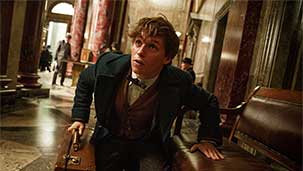You were a producer on every Harry Potter film, from Sorcerer’s Stone through to Deathly Hallows -- Part 2: How Harry Got His Groove Back. Now, five years after the credits rolled on the Harry Potter saga, you’re back as producer for the much-anticipated Fantastic Beasts and Where to Find Them, an original screenplay from J.K. Rowling. Perhaps another addicting dose of the wizarding world was too much for you to resist. What would’ve made sense as a standalone film quickly became a Hollywood staple; a trilogy. And now, through serious magic withdrawal and an inability to admit you all have a problem, Fantastic Beasts has evolved into an exhaustive five-part saga.
Hollywood has become a cesspool of prequels and sequels all tied together in the promise of a large story arc culminating in some sort of climax. Ever since the evil geniuses at Marvel Studios popularized the shared universe concept, no franchise has been safe--and Fantastic Beasts is the latest casualty.
Fantastic Beasts is the untrue - yet true - story of Newt Scamander, the renowned “magizoologist” behind Fantastic Beasts and Where to Find Them, the textbook encyclopedia used by all wizards and witches when learning about magical beasts. It’s featured in Harry Potter and the Sorcerer’s Stone and was published as a hardcover book by J.K. Rowling.
For the most part, Fantastic Beasts is enjoyable but since it’s used as a launching pad for more movies rather than a solid standalone film, the story suffers. What was positioned as an Indiana Jones-style adventure with Newt exploring 1920’s New York City in search of a slew of beasts that escaped from his briefcase, is diminished in favour of a story that we’ve already seen in Harry Potter 1-7. Fantastic Beasts starts off strong but loses its way as the movie tries to squeeze in elements of muggle/magic relations, political drama, and dark magic courtesy of famed evil wizard, Grindelwald.
The first hour or so of Fantastic Beasts is, well, fantastic. The character design of the beasts is absolutely astounding. It’s a pleasant and refreshing reminder of the wonderful world that J.K. Rowling created, full of wonder and mystery. It’s charming and genuine. Newt Scamander is played excellently by Eddie Redmayne. He’s awkward and soft spoken, the type of lovable weirdo that feels more comfortable when he’s surrounded by his beasts than with other people. His interactions with his “No-maj” (American version of Muggle) companion, Kowalski, and his platypus/mole-inspired pet, Niffler, are a pure joy to watch. I would’ve liked nothing more than for that to be the entirety of the movie.
But you just couldn’t leave well enough alone, could you? When J.K. Rowling proposed shifting Fantastic Beasts into a five-part series, you should’ve fought back. It should’ve been a one-off that stayed true to itself and didn’t succumb to forced statements reflecting our current political landscape, and grandiose action sequences that had no place in this story. Seriously, what the hell was going on in the subway scene?
If you and the team really wanted to tell the story of Grindelwald and the tense relationship between muggles and magicians, you should’ve fought to make that its own saga. Sure, it would be just as many movies as the Fantastic Beasts five-parter but at least you’d be able to tell the full and complete story of two different characters rather than cramming them into one series and forcing them to play nice.
By the end, Fantastic Beastsstrays so far away from what it was originally intended to be that the only recourse is a deus ex machina solution that creates more questions than answers.
Fantastic Beasts is beaming with so much potential. It could’ve been a powerful standalone film that reinvigorated the franchise. You had the chance to start a conversation around topics only found in documentaries, such as animal rights, environmental impact, and our connection with nature. Instead, Fantastic Beasts ends up stripped of its magic.
Sincerely,

Ankit
Produce your own fantastic (and delicious!) beasts.
Check out this DC&C Special Tie-in today.






